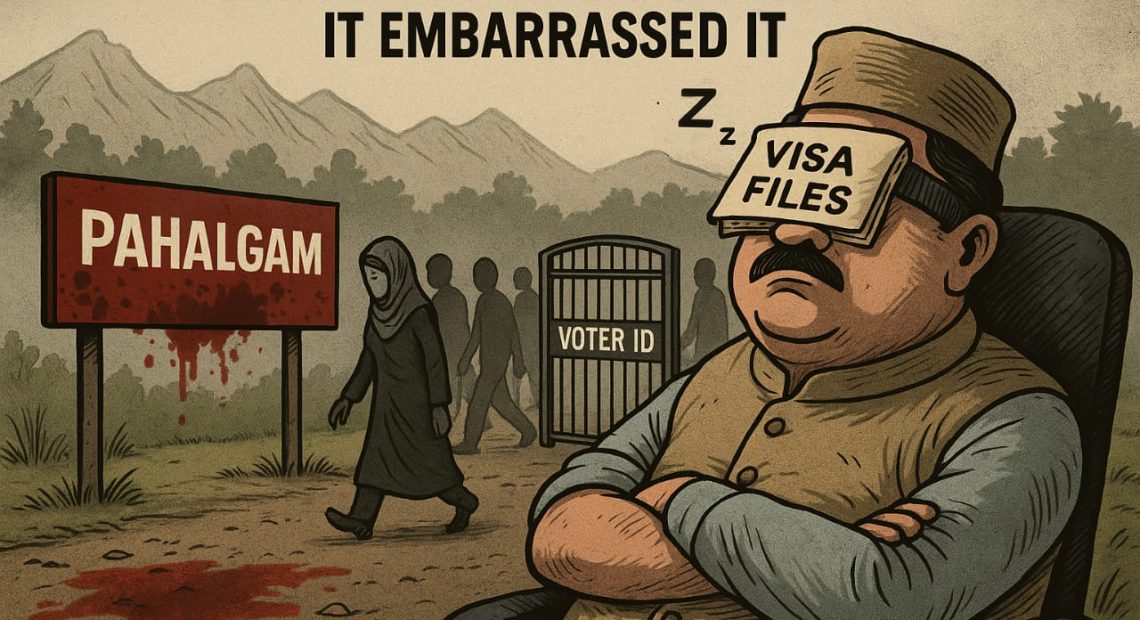
Pahalgam Didn’t Wake the System – It Embarrassed It: A Scathing Indictment of the Government and Home Ministry’s Security Lapses
The massacre at Pahalgam wasn’t just an act of terror — it was an exposure of rot. Twenty-six Hindu civilians were butchered in cold blood, singled out by religious profiling, in a place marketed as “heaven on earth.” The Valley bled, and India scrambled. In the days that followed, deportation drives were launched, border security was beefed up, and the Ministry of Home Affairs went into a PR overdrive. But the question no one in power dared to ask was this: why did it take 26 corpses for the government to act on what was already known?
Let’s start with the most embarrassing case — a CRPF jawan, Munir Ahmed, married to a Pakistani woman named Minal Khan. The Central Reserve Police Force dismissed him for allegedly hiding the marriage and harboring her after her visa expired. He, in turn, claimed he had official permission. Let that sink in. A paramilitary soldier — entrusted with protecting India — married a Pakistani national, allegedly with institutional knowledge. Whether he concealed it or not is secondary; the real scandal is that such a relationship wasn’t automatically red-flagged as a security threat. Has the Home Ministry outsourced background checks to wishful thinking?
The rot doesn’t stop there. A Pakistani man named Osama reportedly overstayed in India for 17 years, obtained an Aadhaar card, and even voted in Indian elections. This isn’t a plot twist from a badly written satire — it’s our reality. A foreign national, living illegally, acquired a national identity and participated in our democracy. How? Because the UIDAI, the Election Commission, and immigration authorities were too disconnected or too disinterested to do their jobs.
And it wasn’t an isolated incident. Gujarat recently detained over 1,000 Bangladeshis — 890 in Ahmedabad alone. Odisha issued exit notices to Pakistani women who had lived undocumented for decades. Uttar Pradesh and Rajasthan admitted they had lists ready and simply executed deportation drives after the central government ordered it. Which begs the obvious question: what were they doing before Pahalgam? Sitting on their hands? Or waiting for bloodshed to make political action palatable?
The Home Ministry — which styles itself as the sentinel of internal security — was asleep at the wheel. There was no central tracking system for long-term visa holders. No exit monitoring after visa expiry. No intelligence coordination with the states until the streets of Pahalgam were soaked in blood. The post-attack flurry of activity proves the system wasn’t incapable — just inert. And when bureaucratic inertia meets political convenience, it’s the citizen who dies.
To make matters worse, when India finally began deporting Pakistani nationals, Pakistan shut the Wagah border and refused to accept its own people. The Ministry of External Affairs mumbled in the background, and no diplomatic escalation followed. A nuclear neighbor insulted our sovereignty by blocking the repatriation of their illegal citizens — and India, the world’s largest democracy, blinked.
Let’s call this what it is: a monumental collapse of governance. Pahalgam didn’t wake the system — it embarrassed it. The government and the Home Ministry were exposed, not activated. The silence and inactivity before the attack scream louder than the announcements made after it.
Prime Minister Modi and Home Minister Amit Shah must recognize that the price of procrastination isn’t a bad news cycle — it’s national security. If India truly wants to prevent the next Pahalgam, it must stop reacting and start anticipating.
We need a National Register of Citizens (NRC), not just in Assam but nationwide, to identify and eliminate illegal settlements. We need a Uniform Civil Code, not for ideological theatrics, but to close legal loopholes that allow sham marriages with foreign nationals under religious protection. And above all, we need a centralized, real-time monitoring system of all foreign nationals residing in India, with mandatory intelligence sharing between the Centre and states.
This isn’t about demonizing Pakistanis or Bangladeshis. This is about ensuring that the Indian identity — its documents, its votes, its security forces — cannot be casually infiltrated by those who have no legal or moral stake in the country.
The next Pahalgam isn’t a matter of “if,” but “when” — unless India learns that vigilance is not a response, but a duty.


















